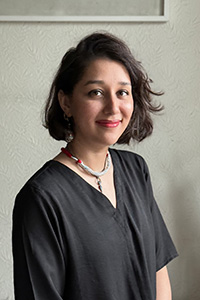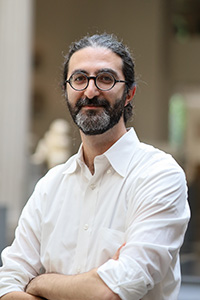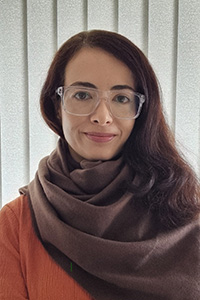The Society of Architectural Historians is pleased to announce the recipients of the 2025 SAH IDEAS Research Fellowship. Part of the SAH IDEAS Initiative, this award is intended to support scholars who self-identify as members of marginalized groups as well as to support research that challenges existing paradigms and represents previously under-recognized and/or unsupported directions for architectural history.
Intended for emerging scholars, the $1000 fellowship award also includes one year of close mentorship from a senior colleague from the SAH community as well as guided lateral interaction across the cohort to encourage peer support. The SAH IDEAS Committee is deeply grateful to the senior scholars who have generously agreed to contribute their time to support each of the fellowship recipients.
Now in its fourth year, the IDEAS Research Fellowship has previously supported 11 scholars from around the world whose research projects have examined landscapes of extraction, immigration, gardens and violence, religious cultural heritage, and slave-built architecture.
The 2025 SAH IDEAS Research Fellowship recipients are listed below along with the names of their mentors.
Zoya Gul Hasan

Zoya Gul Hasan is a researcher, writer and lecturer interested in feminist narratives, troubled archives, and creative methods of writing and disseminating histories of material culture. Her work broadly explores intersections of architecture and gender in South Asia, and often studies how women and marginalised communities exercise agency through the creation of spaces for rest, play, and resistance against patriarchal structures.
Zoya’s current research focuses on the intersection of architecture and menstruation through a critical exploration of the bashali (menstruation house)—a sacred space central to Kalasha culture and life-worlds in north-west Pakistan. Traditionally, the bashali is a communal space for menstruating and birthing individuals, with its own set of unique, age-old rituals and practices. By documenting spaces, objects, and oral accounts of menstrual rituals in the region, and investigating processes of construction, maintenance, and usage of bashalis by Kalasha women, she will contrast indigenous organization around women's health with negative stereotypes of traditional menstrual spaces through a decolonial feminist lens.
She holds an MA in Architectural History from The Bartlett School of Architecture, UCL, and a Bachelor of Architecture from the National College of Arts. She has previously worked with public and institutional archives, and as a lecturer in architectural history at design schools in Lahore, Pakistan.
She will be mentored by Kishwar Rivzi, Robert Lehman Professor in the history of art, Islamic art and architecture at Yale University.
Nader Sayadi

Nader Sayadi is a scholar and educator of architecture and textiles in the early modern Islamic world and the Global South. His research delves into the architectural history of manufacturing spaces in the nonindustrial capitalist world in West and South Asia.
Currently a visiting assistant professor in the Department of Art and Art History at the University of Rochester, he received his PhD in Art History from the University of Texas at Austin. His book project explores the spatial organization and architectural features of silk-weaving (shaʿrbafi) workshops in central Iran in the eighteenth and nineteenth centuries to understand how the integration of labor, machinery, and architecture reflects the commercial capitalist economy of early modern West Asia. By focusing on the modular design of the workshops, this study demonstrates how the “shaʿrbafi module” mediated the loom, worker, and space, offering insights into the labor practices, production systems, and socio-economic structures of the time.
He has presented his work at a variety of international academic fora for art, history, culture, and architecture, including the SAH Annual Conference.
Through the support of this fellowship, he hopes to integrate greater theoretical interpretation into his work and bridge the gap between labor studies and architectural history, ultimately offering a more nuanced understanding of how labor shaped the built environment in pre-industrial contexts.
He will be mentored by Sylvia W. Houghteling, Associate Professor of history of art at Bryn Mawr College.
Lívia Zanelli

Lívia Zanelli is a post-doctoral researcher at the Laboratory for Studies of the Contemporary Urban Environment (LEAUC) at the Institute of Architecture and Urbanism, University of São Paulo. Her main works address issues related to planetary urbanization, urban processes, theory and history of architecture and urbanism, criticism of architecture and urbanism, contemporary architecture, multifamily housing, social housing, and the juxtapositions between architecture and landscape. Additionally, she teaches courses in Design and Theory and History of Architecture and Urbanism.
Having received her PhD from the School of Architecture and Urbanism at the University of São Paulo, her IDEAS Fellowship project extends her doctoral thesis. It continues the investigation into emerging urbanization processes and the role of architecture in the formation of remote urban settlements with extensive ecological intervention. Her work aims to map and analyze public spaces in urbanized areas outside of traditionally established cities. Through case studies in the United States and Brazil, she intends to identify, map, and classify these public spaces, reinterpreting theoretical understandings and concepts to provide critical reflections within the context of intensive urban production.
She will be mentored by Daniela Sandler, Associate Professor of architectural and urban history at the University at Buffalo's School of Architecture and Planning.